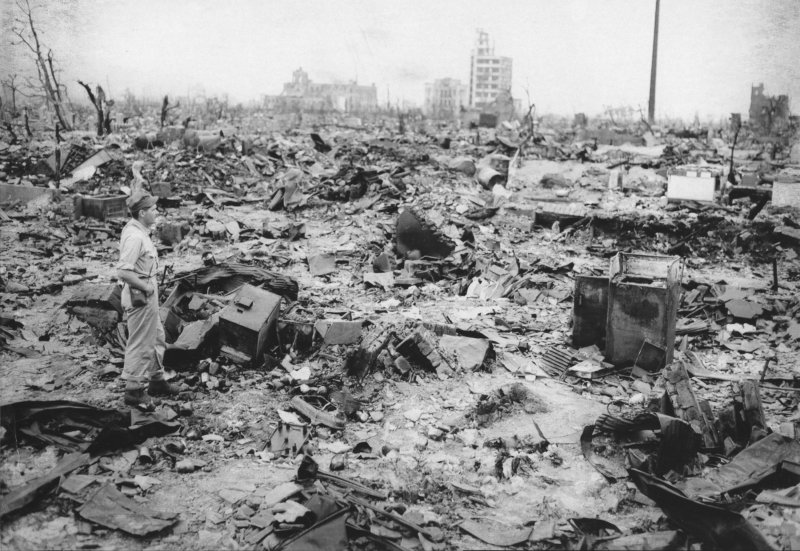1 of 2 | The death and destruction of nuclear weapons detonated over Japan in 1945 was horrific, as pictured in rubble left in Hiroshima after a uranium-based bomb was detonated over the city, but a researcher in France suggests the long-term fallout from use of the bombs has not been nearly as bad as many suspected it would be or assumed it has been. File photo by UPI |
License Photo
PROVENCE, France, Aug. 11 (UPI) -- There is no question that nuclear weapons are the most powerful of the explosive tools of war, but a new review of data suggests the long-term fallout from their use is not nearly as horrific as assumed.
Researchers at Aix-Marseille University in France suggest that for all the death and destruction caused by the detonation of nuclear weapons in Hiroshima and Nagasaki in 1945, health effects were not felt for many who were there or for their children, as has long been suspected.
The United States detonated two nuclear devices over Japan toward the end of World War II -- a uranium-based bomb exploded 600 meters above Hiroshima and a plutonium-based bomb was exploded 500 meters above Nagasaki. In both cases, the bombs generated extreme heat and a pressure blast with a strong burst of gamma radiation.
People exposed to the heat and radiation within 1.5 kilometers of the center of the blast were killed instantly, with more dying in the days immediately following as a result of severe burns and acute radiation.
Estimates and assumptions suggest cancer and genetic mutation, in survivors and their children, was rampant, but an examination of long-term study data by Bertrand Jordan, a molecular biologist at Aix-Marseille University, suggests this has not been the case.
"Most people, including many scientists, are under the impression that the survivors faced debilitating health effects and very high rates of cancer, and that their children had high rates of genetic disease," Jordan said in a press release. "There's an enormous gap between that belief and what has actually been found by researchers."
For the study, published in the journal Genetics, Jordan analyzed data collected by the Radiation Effects Research Foundation, a joint effort by the Japanese and United States governments, which has followed 100,000 survivors of the bombings, 77,000 of their children and 20,000 not exposed to radiation as a comparison group.
Overall, survivors' average lifespan was reduced by only a few months.
The RERF, originally created by President Harry Truman in 1947 as the Atomic Bomb Casualty Commission, reports that relative risk for cancer among survivors is linked to proximity to the detonation site, age and sex -- the closer during detonation the greater health risk, the younger the person the higher the lifetime risk, and a higher risk for women exposed to high rates of radiation than for men.
Most survivors, the RERF reports, did not develop cancer, though incidence of solid cancer was about 10 percent higher among survivors. Survivors who were exposed to higher doses of radiation, about 1,000 times higher than current safety limits, had a 44 percent higher risk of cancer. With all causes of death considered, the average lifespan of survivors exposed to this higher dose of radiation was reduced by 1.3 years.
And while it is possible, no differences in health or mutation rates have been found among the children of survivors, which Jordan said suggests the risk for appears to be very small.
While the researcher does not want to minimize the risk of using nuclear weapons, or their devastating effects in the past, he said accuracy on the effects of the bombs matters.
"This contradiction between the perceived long-term health effects of the Hiroshima and Nagasaki bombs and the actual data are extremely striking," Jordan writes in the study. "Part of this distortion must stem from the fact that radiation is a new and unfamiliar danger in the history of mankind, an agent that is unseen and unfelt, whose nature and mode of action are mysterious."
He also emphasizes, in the conclusion of the study, that "it is important to try to clear up these questions, and to disseminate widely the scientific data when they exist, in order to allow for a balanced debate and more rational decisions."















